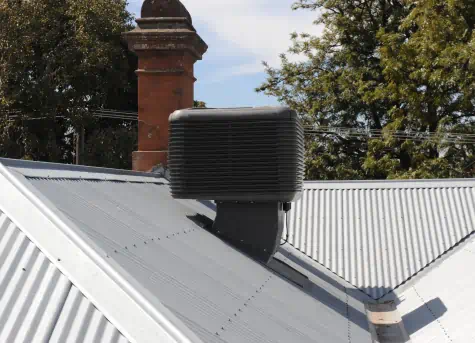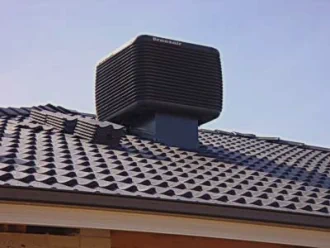
Evaporative Cooling vs Traditional Air Conditioning: Which Is Better for Your Home?
Choosing the perfect cooling system for your home can feel overwhelming. With so many air conditioning options out there, it's essential to know the difference between the two most popular choices: evaporative cooling and traditional air conditioning systems (like split or ducted systems). Each offers distinct advantages depending on your needs–whether you're focused on cost, energy efficiency, or the climate where you live.
How Evaporative Cooling Works
Evaporative cooling taps into nature’s cooling process by using water. Warm, dry air is drawn through water-soaked pads, where the evaporation cools it. This cooler, fresher air is then circulated throughout your home, providing a natural and refreshing breeze. It’s a simple yet highly effective system, especially in dry climates.
How Traditional Air Conditioning Works
Traditional air conditioners use refrigerants and compressors to absorb heat from your home and release it outdoors. There are two main types: split systems and ducted refrigerated systems. Split systems are ideal for cooling individual rooms, while ducted systems distribute cool air to every corner of your home, providing whole-house comfort.
Comparing Key Factors
Cost
- Evaporative Cooling: One of the standout features of evaporative cooling is its low initial cost. Installation is simpler and cheaper since there’s no need for complex ductwork or refrigerant lines. Maintenance is also more affordable, as there are fewer high-cost components to worry about.
- Traditional Air Conditioning: While ducted systems are more expensive upfront, single split systems are typically more affordable but may require multiple units to cool your entire home, increasing the overall cost.
Energy Efficiency
- Evaporative Cooling: This system is highly energy-efficient, using around 80% less electricity than traditional air conditioning. Since it only powers a fan and pump, it's an eco-friendly choice that helps reduce both your energy bills and carbon footprint.
- Traditional Air Conditioning: Older models can be energy hogs, but newer systems are becoming more efficient. High-rated split systems allow selective room cooling, making them a smarter choice for energy-conscious homeowners when used correctly.
Performance in Different Climates
- Evaporative Cooling: Evaporative systems excel in hot, dry climates like those found in southern Australia. They perform best when the air is dry because evaporation works most efficiently in low-humidity environments. In contrast, humid climates reduce their effectiveness.
- Traditional Air Conditioning: These systems shine in any climate, especially in high-humidity regions. They remove heat and moisture from the air, making them a reliable option for maintaining cool, comfortable indoor temperatures year-round.
Which Is Better for Your Home?
- Choose Evaporative Cooling If... you live in a hot, dry region, value energy efficiency, and want a cost-effective cooling solution. Evaporative cooling offers fresh, natural air without chemicals or excessive energy use.
- Choose Traditional Air Conditioning If... you live in a humid area or need precise, powerful temperature control throughout the year. Traditional air conditioning is ideal for those seeking maximum comfort, no matter the weather.
Coldflow Heating and Cooling: Experts in Evaporative Cooling Installation
If you're considering evaporative cooling for your home, Coldflow Heating and Cooling is your trusted partner. With years of experience, we specialize in installing efficient evaporative systems that keep your home cool and comfortable throughout summer. Whether you need evaporative cooling, split systems, or ducted air conditioning, Coldflow has the perfect solution for your needs.
Find out more about our services, book an appointment online, or visit our contact page to get in touch today!
View Air Conditioning Articles







 Dealer Only Brands: Daikin, Breezair, etc.
Dealer Only Brands: Daikin, Breezair, etc.
